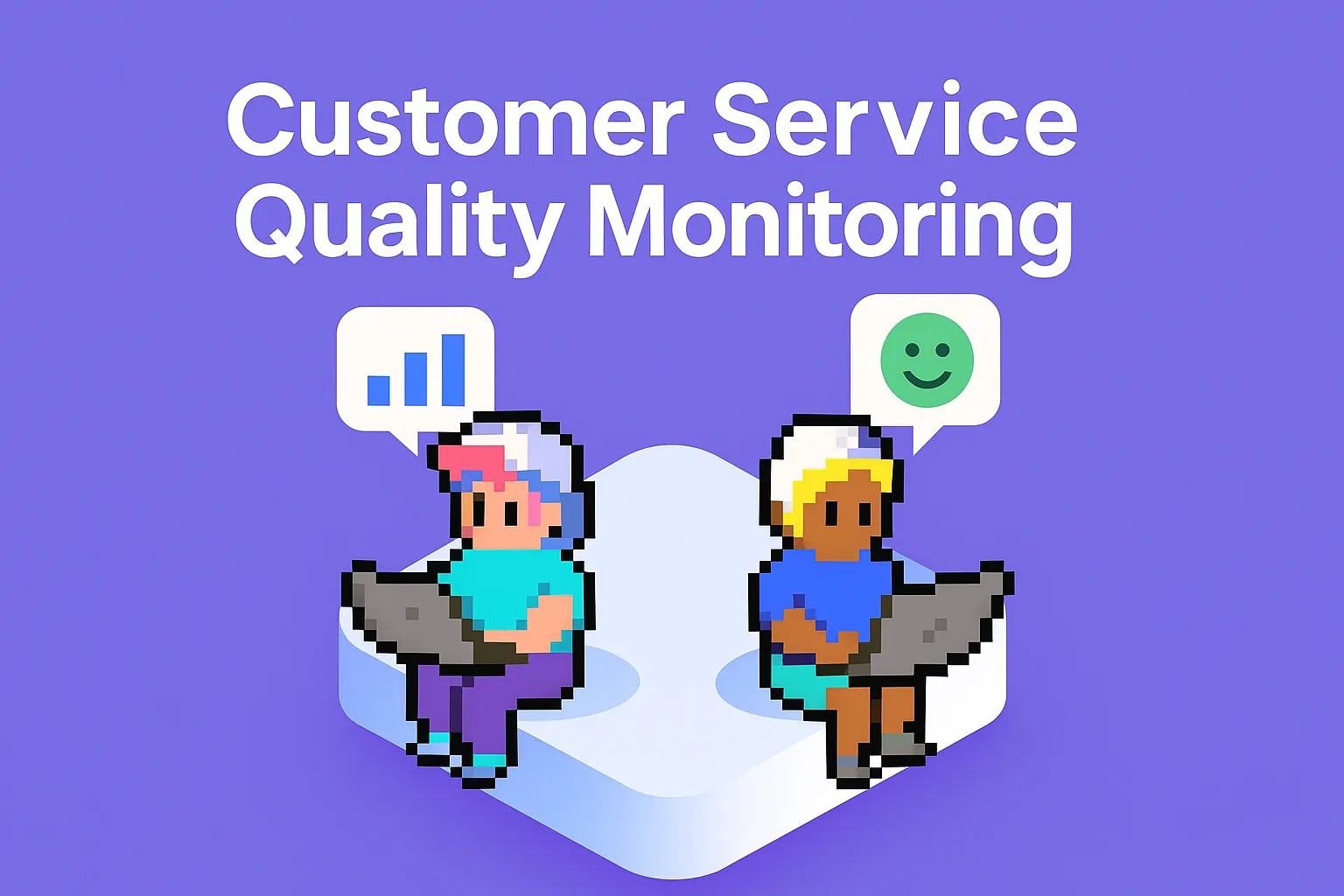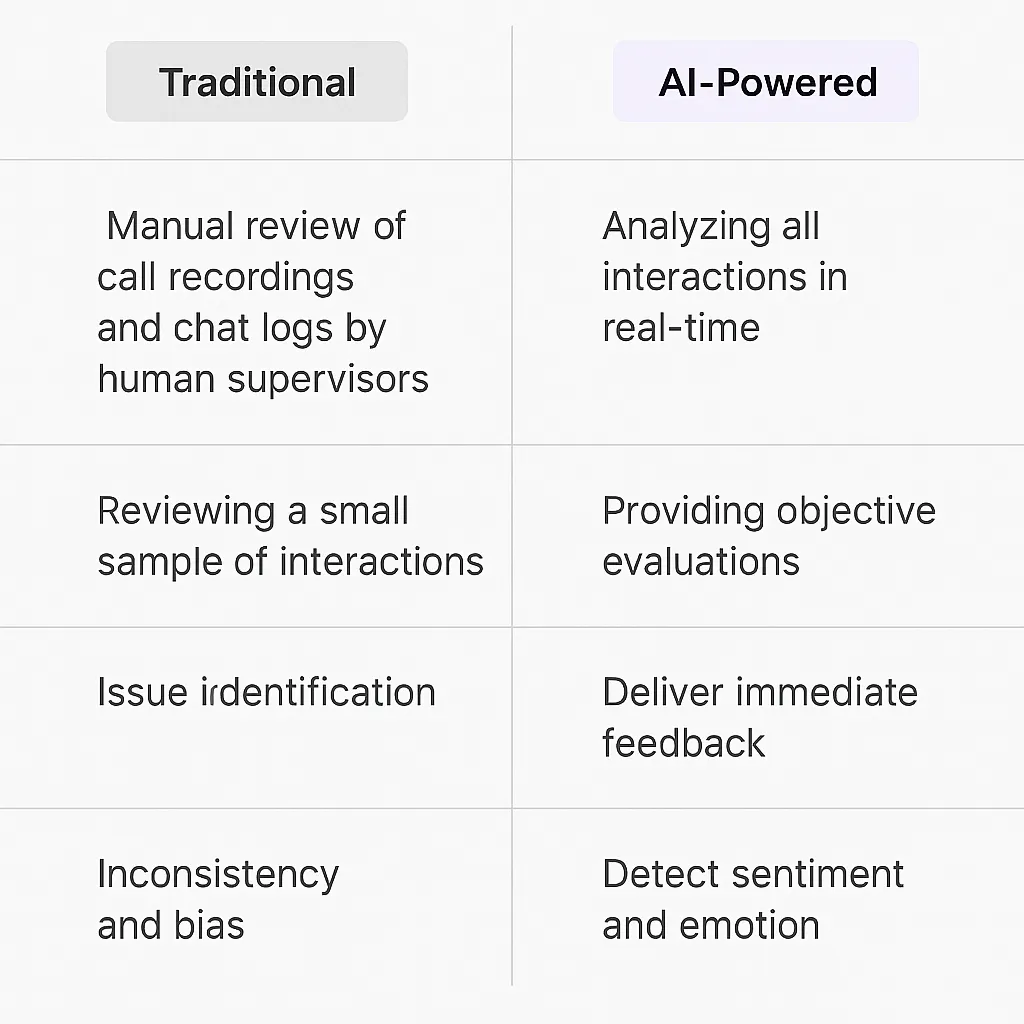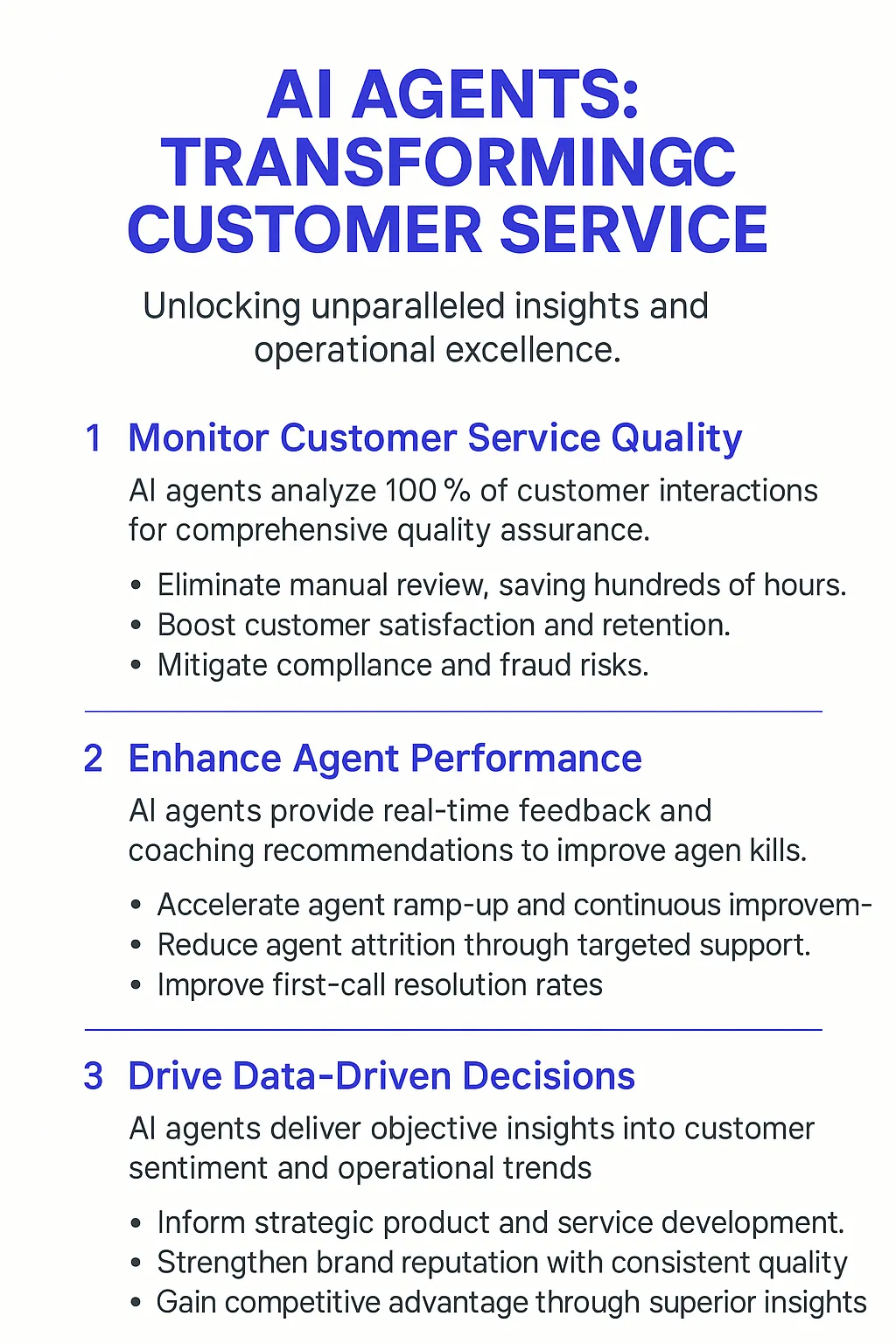Customer Service Quality Monitoring AI Agents
The Evolution of Customer Service Quality Monitoring
Customer Service Quality Monitoring is the process of evaluating and improving customer interactions across various touchpoints. It's the backbone of ensuring consistent, high-quality service delivery. Traditionally, this involved manual review of call recordings and chat logs. Now, AI agents are revolutionizing this field, offering real-time analysis, sentiment detection, and actionable insights at an unprecedented scale.
The key features of modern Customer Service Quality Monitoring include:
- Real-time interaction analysis across all channels (voice, chat, email)
- Sentiment and emotion detection
- Compliance adherence tracking
- Automated quality scoring
- Trend identification and pattern recognition
- Personalized agent coaching recommendations
- Integration with existing CRM and communication systems
These features, powered by AI, are redefining what's possible in service quality management, enabling businesses to deliver exceptional customer experiences consistently and at scale.

Benefits of AI Agents for Customer Service Quality Monitoring
What would have been used before AI Agents?
Before AI agents entered the scene, customer service quality monitoring was a labor-intensive process. Companies relied on human supervisors to manually listen to call recordings, read through chat logs, and analyze customer interactions. This approach was not only time-consuming but also prone to inconsistencies and human bias. Quality assurance teams would spend hours sifting through data, often only able to review a small sample of interactions due to resource constraints.
The traditional method also struggled with real-time feedback. By the time issues were identified, the opportunity for immediate correction had often passed. This lag between interaction and analysis meant that suboptimal customer experiences could persist for extended periods before being addressed.
What are the benefits of AI Agents?
AI agents are transforming customer service quality monitoring in ways that were previously unimaginable. These digital teammates are capable of analyzing 100% of customer interactions across all channels, providing a comprehensive view of service quality that human teams simply couldn't achieve at scale.
One of the most significant benefits is the ability to provide real-time insights. AI agents can flag issues as they occur, allowing managers to intervene and correct problems on the spot. This immediate feedback loop dramatically improves the speed at which organizations can enhance their customer service.
Moreover, AI agents bring a level of objectivity to quality monitoring that's hard to match with human reviewers. They apply consistent criteria across all interactions, eliminating the variability that comes with different human reviewers. This consistency leads to more reliable data and fairer evaluations of customer service representatives.
The pattern recognition capabilities of AI agents are particularly impressive. They can identify trends and correlations that might escape even the most astute human analyst. For instance, an AI agent might notice that customer satisfaction scores dip slightly when representatives use certain phrases or that resolution times improve when a specific troubleshooting sequence is followed.
Another game-changing benefit is the ability to analyze sentiment and emotion in customer interactions. AI agents can detect nuances in tone, word choice, and even pauses in conversation to gauge customer satisfaction levels. This emotional intelligence allows companies to address not just the functional aspects of customer service but also the emotional experience of their customers.
Lastly, AI agents free up human quality assurance teams to focus on higher-level strategy and complex problem-solving. Instead of spending hours listening to calls, these professionals can now dedicate their time to developing training programs, refining service protocols, and tackling the most challenging customer issues.
In the world of customer service quality monitoring, AI agents aren't just an incremental improvement—they're a quantum leap forward. They're enabling companies to deliver consistently excellent customer experiences at a scale and speed that was previously impossible. As these technologies continue to evolve, we can expect even more sophisticated analysis and insights, further elevating the standard of customer service across industries.

Potential Use Cases of AI Agents for Customer Service Quality Monitoring
Processes
Customer service quality monitoring is ripe for AI-driven transformation. These digital teammates can revolutionize how companies assess and improve their customer interactions. Let's dive into some game-changing use cases:
- Real-time conversation analysis: AI agents can listen in on customer calls, parsing sentiment, tone, and content to provide instant feedback to agents.
- Compliance adherence tracking: These digital teammates can monitor conversations for adherence to regulatory requirements and company policies, flagging potential issues before they become problems.
- Trend identification: By analyzing large volumes of customer interactions, AI agents can spot emerging issues or opportunities that human analysts might miss.
- Quality scoring automation: AI can apply consistent scoring criteria across all customer interactions, eliminating human bias and increasing efficiency.
Tasks
Breaking it down further, here are some specific tasks where AI agents can make a significant impact:
- Keyword and phrase detection: Identifying specific words or phrases that indicate customer satisfaction, dissatisfaction, or potential upsell opportunities.
- Emotion detection: Analyzing voice tone and language to gauge customer emotions throughout the interaction.
- Script adherence checking: Ensuring agents follow prescribed scripts or guidelines during customer interactions.
- Response time analysis: Measuring and reporting on key metrics like average handle time and first-call resolution.
- Coaching recommendation generation: Providing personalized improvement suggestions for individual agents based on their performance.
The potential of AI in customer service quality monitoring is massive. It's not just about automation; it's about augmenting human capabilities and unlocking insights that were previously hidden in the noise of countless customer interactions. As these digital teammates become more sophisticated, we'll see a shift from reactive monitoring to proactive improvement of customer service quality.

Industry Use Cases
AI agents are reshaping customer service quality monitoring across sectors, offering nuanced insights that were previously unattainable. These digital teammates aren't just observing interactions; they're actively learning, adapting, and providing actionable intelligence. Let's dive into some industry-specific scenarios where AI is elevating the game:
E-commerce giants are leveraging AI to decode customer sentiment in real-time, allowing them to intervene in potentially negative experiences before they escalate. In the healthcare sector, AI agents are helping maintain HIPAA compliance while simultaneously improving patient satisfaction scores. Financial institutions are using these tools to detect subtle cues in customer interactions that might indicate fraud or dissatisfaction with services.
The hospitality industry is tapping into AI-driven quality monitoring to personalize guest experiences at scale, turning data into delight. Tech support teams are employing AI to identify knowledge gaps among support staff, leading to more targeted training programs. Even government agencies are getting in on the action, using AI to ensure consistent quality across diverse citizen interactions.
Each of these use cases represents a fundamental shift in how organizations approach customer service quality monitoring. It's not just about monitoring anymore; it's about predicting, preventing, and perfecting every customer touchpoint. The ability to track and improve customer satisfaction scores in real-time has become a game-changer for businesses across all sectors.
Retail Revolution: AI-Powered Quality Monitoring in E-commerce Customer Service
Let's dive into the world of e-commerce, where customer service can make or break a brand. Picture Amazon, but with an AI twist that's about to change the game.
E-commerce giants are locked in a constant battle for customer loyalty. The differentiator? It's not just price anymore—it's the quality of customer interactions. Enter AI-powered quality monitoring for customer service.
Here's the kicker: these AI agents don't just listen in on calls or scan chat logs. They're analyzing every interaction in real-time, picking up on subtle cues that human supervisors might miss. We're talking tone, sentiment, and even the unsaid frustrations in a customer's voice.
But it gets better. These digital teammates are learning and adapting on the fly. They're not just flagging issues; they're predicting them. Imagine an AI that notices a pattern of confusion around a new product feature and proactively suggests updates to the FAQ before complaints start rolling in.
For the e-commerce behemoths, this means a seismic shift in how they approach customer service training and quality control. Gone are the days of random call sampling and subjective evaluations. Now, every single interaction is a data point, feeding into a constantly evolving model of what great customer service looks like.
The real magic happens when this AI integrates with inventory systems and logistics. A customer's frustration about a delayed package? The AI doesn't just apologize—it checks the shipping status, predicts a new arrival date, and offers personalized compensation options, all in real-time.
This isn't just about damage control. It's about turning every interaction into an opportunity to delight and retain customers. In the cutthroat world of e-commerce, where switching costs for customers are virtually zero, this level of service quality could be the moat that keeps customers coming back.
The implications are massive. We're looking at a future where the best customer service agents aren't just born—they're continuously created through AI-powered insights and coaching. It's a brave new world where the human touch is enhanced, not replaced, by artificial intelligence.
For e-commerce players, the message is clear: adapt or be left behind. The companies that harness this technology won't just be competing on price or selection—they'll be competing on the ability to make every customer feel heard, understood, and valued at scale. And in this game, that's the ultimate competitive advantage.
Financial Services: AI-Driven Quality Monitoring Reshapes Customer Experience
The financial services industry is ripe for disruption, and AI-powered quality monitoring is the catalyst. Let's zoom in on how this technology is transforming customer service in banking and investment firms.
Banks have long struggled with the balance between efficiency and personalization. Traditional quality assurance methods often fall short, leaving customers frustrated and employees disengaged. But what if every interaction could be a learning opportunity?
AI agents are now analyzing millions of customer interactions across phone, chat, and email channels. They're not just looking for keywords or script adherence; they're decoding emotional nuances, identifying pain points, and spotting opportunities for upselling that human agents might miss.
Consider a high-net-worth client calling about a complex investment strategy. The AI doesn't just monitor the call—it cross-references the client's portfolio, market trends, and the bank's current offerings in real-time. It then guides the human agent to provide tailored advice that aligns with the client's risk profile and the bank's objectives.
But the real game-changer is how these AI agents are reshaping training and performance management. They're creating personalized coaching plans for each employee, identifying areas for improvement with surgical precision. It's like having a world-class mentor for every single agent, available 24/7.
The ripple effects are profound. Customer satisfaction scores are skyrocketing as clients receive more informed, empathetic service. Employee turnover—a chronic issue in financial services—is plummeting as agents feel more supported and see clear paths for skill development.
Moreover, these AI systems are becoming predictive powerhouses. They're flagging potential compliance issues before they occur, helping banks stay ahead of regulatory changes. In an industry where a single misstep can cost millions in fines, this proactive approach to compliance monitoring is nothing short of revolutionary.
The implications for the financial services landscape are massive. Smaller, more agile fintech startups can now compete with banking giants on service quality, leveling the playing field. Meanwhile, established players that embrace this technology can defend their turf by offering unparalleled, hyper-personalized experiences at scale.
We're witnessing the birth of a new era in financial services—one where AI doesn't replace the human touch but amplifies it. The banks that recognize this shift and act quickly will emerge as the titans of tomorrow's financial world. Those that don't? They risk becoming the Blockbuster of banking, wondering how they missed the digital revolution happening right under their noses.
Considerations
Technical Challenges
Implementing a Customer Service Quality Monitoring AI Agent isn't a walk in the park. It's more like trying to teach a robot to understand the nuances of human emotion while juggling flaming swords. The first hurdle? Data quality. Your AI is only as good as the data you feed it, and customer service interactions are messy. They're filled with slang, context-dependent phrases, and enough sarcasm to make even the most sophisticated language model scratch its virtual head.
Then there's the integration nightmare. Your AI needs to play nice with existing CRM systems, ticketing platforms, and communication channels. It's like trying to get a group of toddlers to form a synchronized swimming team - theoretically possible, but prepare for some spectacular belly flops along the way.
Let's not forget about scalability. As your customer base grows, can your AI keep up? Or will it start sweating silicon when the queries start flooding in? Building an AI that can handle the load without turning into a digital puddle is a challenge that keeps many a CTO up at night.
Operational Challenges
On the operational front, we're dealing with a whole different beast. First up: the human factor. Your customer service reps might view the AI as the Terminator of jobs. Convincing them that it's more R2-D2 than T-800 is crucial. You need to sell them on the idea that the AI is there to make their lives easier, not to replace them. Good luck with that.
Then there's the training conundrum. Your AI needs constant fine-tuning to stay relevant. It's like having a perpetual teenager - always learning, often misunderstanding, and occasionally making you want to pull your hair out. Who's responsible for this ongoing education? How do you ensure the AI doesn't pick up bad habits or biases?
Privacy and security are another can of worms. Your AI is handling sensitive customer data. One slip-up, and you're not just facing angry customers; you're staring down the barrel of regulatory fines that could make your CFO cry. Balancing data usage for improvement with ironclad security is like trying to juggle eggs while riding a unicycle - on a tightrope.
Lastly, there's the ROI question. How do you measure the success of your AI? Customer satisfaction scores? Efficiency metrics? The reduction in the number of times your support team considers a career change to goat farming? Defining and tracking meaningful KPIs is essential, but it's about as straightforward as nailing jelly to a wall.
Implementing a Customer Service Quality Monitoring AI Agent is a complex dance of technology, psychology, and business strategy. It's not for the faint of heart, but for those who pull it off, the rewards can be game-changing. Just remember, in the world of AI, "easy" is a four-letter word.
The Dawn of AI-Powered Customer Service Excellence
Customer Service Quality Monitoring AI Agents are not just a tool; they're a paradigm shift. They're turning every customer interaction into a goldmine of insights, enabling businesses to deliver personalized, empathetic service at scale. The companies that harness this technology will create a new breed of super-agents, augmented by AI but driven by human empathy.
But let's be real - implementing these systems is no cakewalk. It's a complex dance of technology, change management, and strategic vision. The challenges are significant, from data quality issues to employee resistance. Yet, for those who navigate these waters successfully, the rewards are transformative.
We're at the dawn of a new era in customer service. The winners won't just be those with the best products or the lowest prices, but those who can make every customer feel truly understood and valued. In this new world, AI-powered customer service quality monitoring isn't just a competitive advantage - it's the price of entry.
The future of customer service is here, and it's powered by AI. Are you ready to lead the charge, or will you be left explaining to your board why your competitors suddenly seem to have psychic powers when it comes to customer needs? The choice is yours, but remember - in the world of AI-powered customer service, the future waits for no one.













